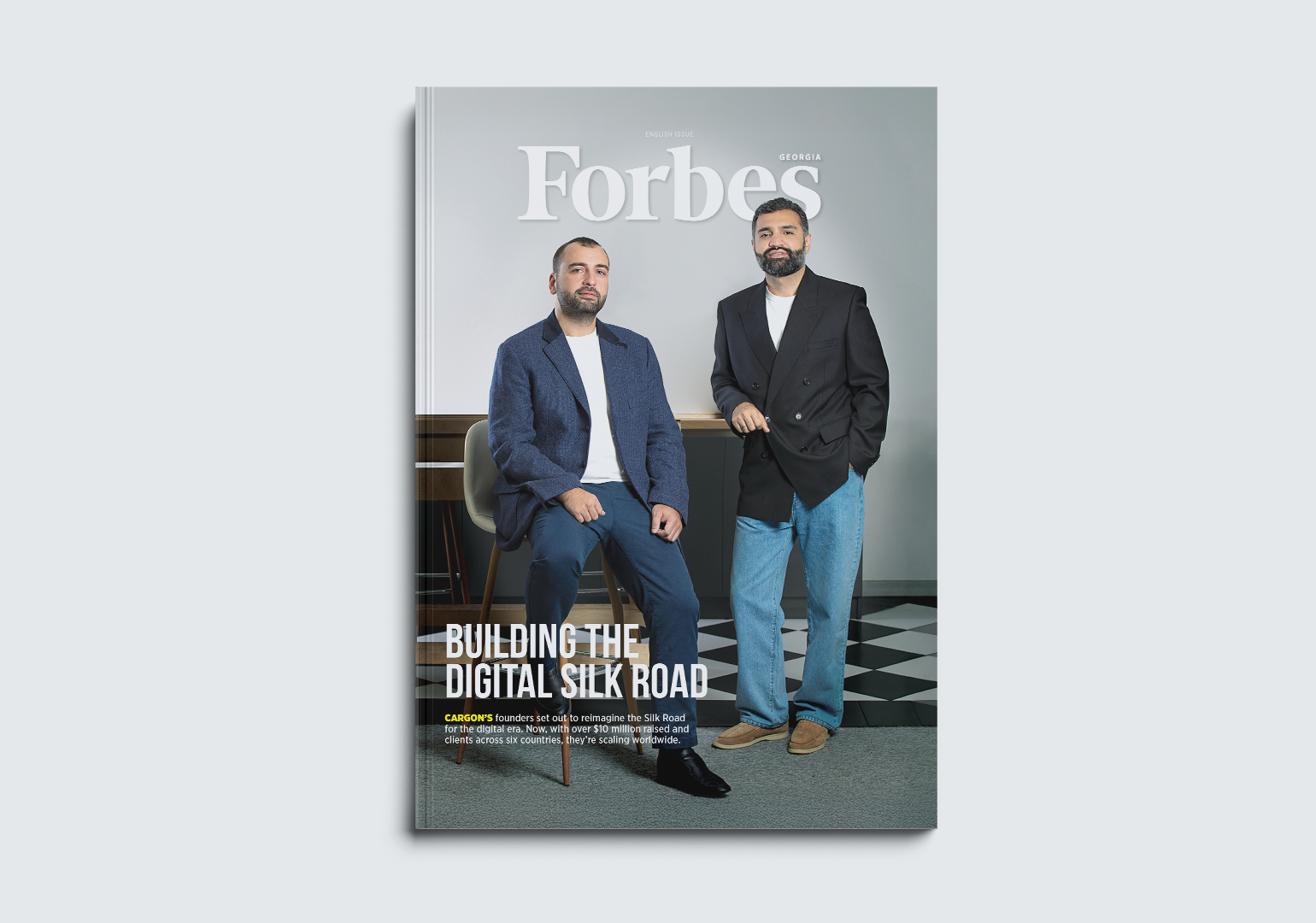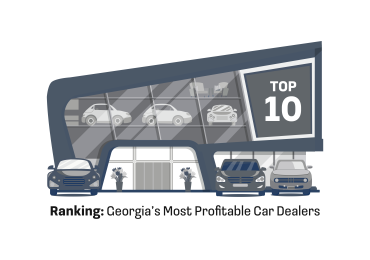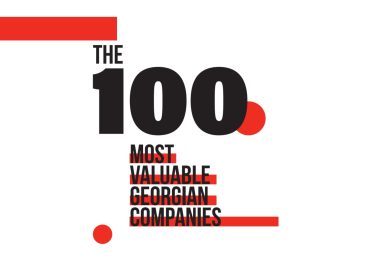We are pleased to present the 39th English issue of Forbes Georgia. This issue features a variety of articles on topics such as business, entrepreneurship, and economics. We hope you enjoy reading it as much as we enjoyed putting it together.
Cover Story
◾ Building the Digital Silk Road | By: Anina Tepnadze
When Niko Turabelidze, Vano Chaladze and Shalva Jalabadze founded Cargon in Georgia, their goal was to bring digital tools to one of the world’s most traditional industries. With $7 million in new funding and major multinational clients across six countries, they now aim to expand through Europe and Asia — and revive the Silk Road in a modern, tech-driven form.
Leaderboard
◾ The Top 10 Highest-Paying Sectors
According to Geostat, the average monthly salary in Georgia in 2024 was ₾2,059. After deducting income tax and pension contributions, the average take-home salary amounts to ₾1,614. Compared to 2023, the nominal average salary increased by 16.5% in 2024. Real wage growth, which accounts for inflation, was 14.6%.
◾ How Is Tbilisi’s Budget Spent?
Tbilisi’s budget for 2025 amounts to ₾2.3 billion. This is the total sum the city government plans to spend this year. According to the current draft budget, this amount may still change. Compared to 2024, the budget has increased by 9.3% (₾194 million). Over the past ten years, Tbilisi’s budget has almost doubled.
◾ The 100 Most Valuable Georgian Companies
There are roughly 90,000 registered companies in Georgia, with only 0.6% classified as large enterprises and 2.5% as medium-sized businesses. The rest are small companies. As of 2023, the combined value of the top hundred most valuable companies in Georgia exceeded 77.6 billion GEL.
Thought Leaders
◾ Strategic Autonomy: Understanding Georgia’s Foreign Policy Realignment | By: Gabriella Calder
Georgia’s foreign policy trajectory under Georgian Dream serves as a warning. In the current era of great power struggles, small states are becoming increasingly vulnerable to authoritarian manipulation. NATO’s attention to its periphery has lagged — allowing once-reliable partners to drift, hedge, and in some cases, recalibrate entirely.
◾ The Rise of the “Fintech”: How Digital Assets and Open Finance Are Transforming the Global Economy | By: Ibrahim Khasyiev
Examining the evolution of financial systems towards a “finternet” – a decentralised, interoperable network powered by digital assets, blockchain, and open finance.
◾ Why Has Inflation Accelerated in Georgia? | By: Egnate Shamugia
Inflation has accelerated in Georgia. At present, the rate of price growth exceeds the target of 3%. As of May 2025, the annual growth of the Consumer Price Index (CPI) stood at 3.5%.
◾ In the Caucasian Chalk Circle, Is Georgia the Only One Left? | By: Aka Zarqua
As the joke went: “In the conflict between Armenia and Azerbaijan, Russia has always supported the conflict,” a grim punchline with more than a grain of truth. The Karabakh conflict, like those in Abkhazia, South Ossetia, and Transnistria, was one of Moscow’s key instruments of influence across the post-Soviet space.
From Our Partners
◾ Redefining Urban Living | By: Iza Gvaramadze
Three months ago, Maqro Development unveiled its most ambitious project yet — Maqro City Tbilisi. In that short time, the multifunctional complex has already sold 1,000 of its 4,000 apartments. The company attributes its rapid success to a clear vision and a carefully crafted strategy, refined over years of tackling challenges in Georgia’s real estate market.
◾ Banking Beyond Numbers | By: Kakhi Chakvetadze
Since its establishment in 2013, PASHA Bank Georgia has focused exclusively on corporate banking, offering tailored financial solutions that empower businesses to grow. The bank has expanded its activities in Georgia and the region, reporting steady growth and strengthening its role in cross-border projects. We asked Ramil Imamov, CEO of PASHA Bank Georgia, to reflect on the bank’s journey and share what’s next.
Technology
◾ A Dynamic Menu for a Dynamic World | By: Anina Tepnadze
The startup Chama was founded by childhood friends Tornike Gagua and Giorgi Loria when they were 20 years old. Their dynamic digital menu platform helps restaurants optimize capacity while allowing customers to pay less for their favorite dishes. Chama recently won a ₾150,000 grant from Georgia’s Innovation and Technology Agency (GITA).
Entrepreneur
◾ Financial Analytics for Everyone | By: Anina Tepnadze
Amadeo, a fintech platform founded by Giorgi Chugoshvili, offers financial analytics to small and medium-sized businesses — services that until now were available only to large companies. With a zero percent customer churn rate and an investment of ₾240,000 raised, the newly established startup shows potential to strengthen Georgia’s business ecosystem.
◾ Smart Renovation | By: Anina Tepnadze
For a year and a half, the co-founders of the conceptual renovation company Confidence, Kakhi Lobzhanidze and Giorgi Demetrashvili, have completed around 20 residential and commercial projects. Their unique approach to renovation transforms the usually stressful repair process into a smooth and well-organized experience.
◾ The Mentorpreneur | By: Iza Gvaramadze
Davit Tsitskishvili’s entrepreneurial journey began about 15 years ago. Along the way, he encountered more than his share of challenges. Yet instead of holding him back, these tough experiences became his greatest guide toward success. Today, he helps aspiring entrepreneurs carve out their own paths — while preparing himself for new entrepreneurial adventures ahead.
Strategy
◾ International Recognition for Local Success | By: Anina Tepnadze
For 17 years, audit and consulting firm Moore has been building its success story in Georgia. According to SARAS data, in 2024, Moore recorded 63% growth, ranking 8th among audit firms in Georgia and taking 2nd place in the country for annual revenue growth. Forbes Georgia sat down with the firm’s partners — Misha Abaidze, Sopho Abaidze, Teona Abdushelishvili, and Paata Chubinidze — to discuss Moore’s journey and plans.
Management
◾ A New Leader on the Path to Universalization | By: Iza Gvaramadze
Liberty is among the largest commercial banks in the country, providing services to over 1.7 million customers. Since February 2025, Nino Chaduneli has been leading the retail banking division, bringing 18 years of diverse experience in the financial industry. Her goal is to help the bank reach universalization and solidify its standing as a leader in the industry.
◾ Created in Collaboration | By: Anina Tepnadze
Anagi Collab is a new initiative by Anagi Group, one of Georgia’s top companies in the construction industry. It provides investors and developers with comprehensive real estate outsourcing services. Forbes Georgia spoke with Tamar Gaprindashvili, General Director of Anagi Collab, about the company’s plans for the future and its flagship project, Tbilisi Acres.
Economy
◾ What Drives Economic Growth in Georgia? | By: Beso Namchavadze
The main drivers of Georgia’s strong economic growth in 2022–2023 were the end of the pandemic and the Russia-Ukraine war. Several countries, including Georgia, benefited economically from the war more than they suffered.
According to Geostat data, Georgia’s economy grew by 9.4% in 2024. In the first quarter of 2025, preliminary data indicates a 9.3% growth.
◾ How Did Georgia’s Tourism Sector Perform in the First Half of 2025? | By: Beso Namchavadze
Tourism plays a significant role in Georgia’s economy. Household incomes, overall economic growth, and the stability of the Georgian lari are all closely tied to revenue generated by the sector. For example, in 2024, Georgia recorded a $6.6 billion trade deficit in goods, of which $3.9 billion was offset by tourism income.
History
◾ The Great Merchants and Their Political Role in Medieval Georgia | By: Nika Khoperia
Trade connected East and West, South and North; through it, ideas and innovations spread, and cultures blended. In medieval feudal states, whose revenues depended largely on meager agricultural production, artisans and merchants gained a special role from the 11th to the 12th centuries onward. The growth of cities, urbanization, development, the connection between countries, and the creation of wealth were all made possible precisely by this segment of society positioned between the feudal estates — the nobility, peasants, and clergy.
Forbes Georgia: სარედაქციო გუნდი
















